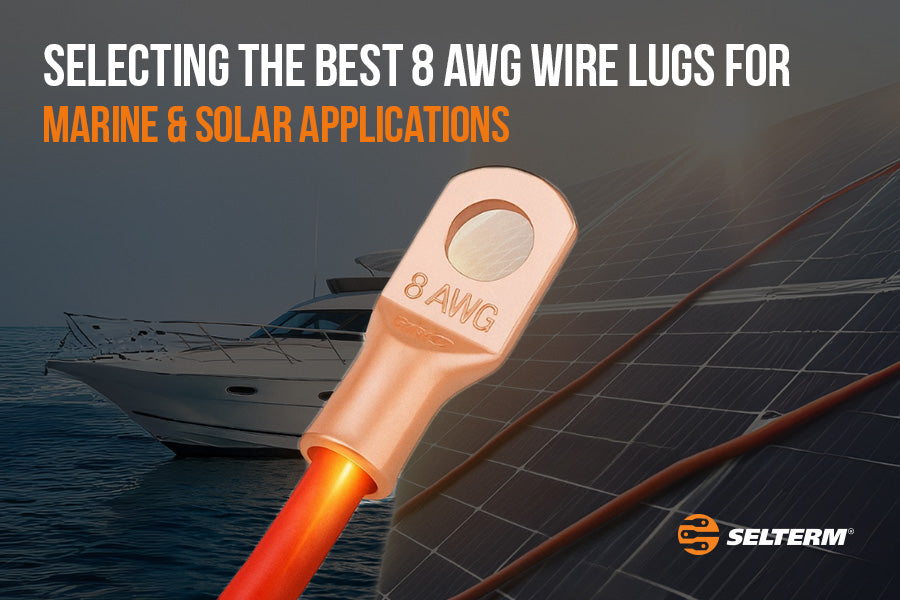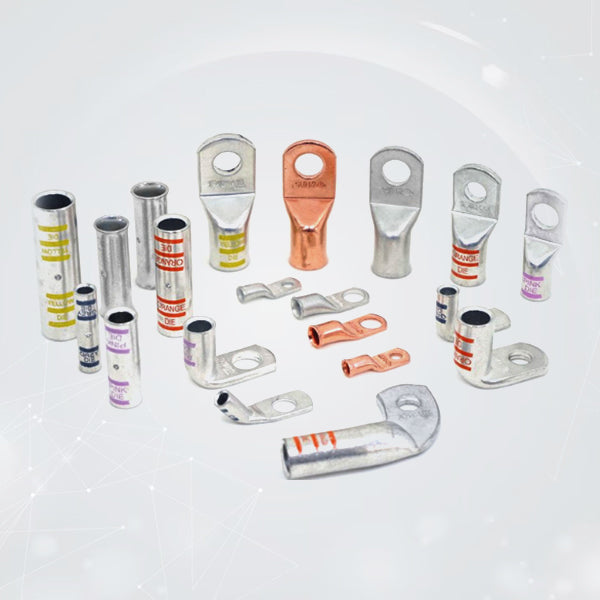
Selecting The Best 8 AWG Wire Lugs For Marine & Solar Applications
In any electrical system, every link is crucial. But when you are working with systems in open water or off-grid solar applications, your wire terminations do more than carry current; they provide a barrier against corrosion, vibration, and long-term abuse. That’s where 8 AWG wire lugs come into play.
Whether you are wiring a solar battery bank, wiring power on a boat, or just upgrading your electrical layout choosing the correct 8 gauge lugs, also known as 8 Awg wire lugs, or 8 gauge terminal lugs, will ensure your setup remains functional, safe, and stable for many years to come.
Why 8 AWG Matters In Marine And Solar Projects
The 8 AWG wire size hits a sweet spot; it’s thick enough to handle significant current, but still flexible enough for tight routing. That’s why it’s a go-to size for:
- Connecting charge controllers to batteries in small to mid-size solar systems
- Wiring boat electronics, bilge pumps, or auxiliary power
- RV and camper van systems with moderate current loads
- Trolling motors and fish finders in freshwater setups
But just having the right wire isn’t enough; the real performance comes from how you terminate that wire. That’s where 8 gauge terminal lugs make all the difference.
What Makes A Good 8 Gauge Lug?
When you're dealing with moisture, heat, and constant movement, like in marine or solar environments, your lug has to be more than just a connector. Here’s what to look for:
1. Material Quality
Go with high-conductivity copper. It ensures minimal voltage drop and supports stable power flow under load. Selterm’s 8 AWG single wire lugs are made from 99.9% pure copper and UL-listed, meaning you can trust them in critical setups.
2. Corrosion Resistance
Saltwater and humidity can break down cheap connectors in no time. Tinned copper options provide excellent resistance to oxidation, making them ideal for boats or coastal setups. Even if you’re using bare copper, combine it with quality heat shrink tubing for extra protection.
3. Solid Crimp Design
A good lug should support a strong mechanical bond. Look for lugs with heavy walls and a smooth, flared barrel. This ensures the wire sits snugly and the crimp holds tight, even with vibration.
4. Precise Sizing
The lug must fit your 8 AWG wire perfectly, not too loose, not too tight. And don’t forget the stud size,
Use Cases: Where These Lugs Shine
Let’s look at some real-world scenarios where a well-made 8 AWG wire lug proves its worth.
Marine Battery Setups
Boat environments are tough; exposure to saltwater, constant motion, and tight compartments all add stress to electrical systems. Lugs need to be both corrosion-resistant and mechanically strong.
Off-Grid Solar Installations
In solar systems, 8 gauge wires often connect charge controllers, batteries, or smaller inverters. Poor terminations here can lead to inefficient charging or voltage drops. A properly crimped lug not only secures the connection but also prevents heat buildup, a common issue in systems that run around the clock.
RV And Camper Systems
Vibrations and heat fluctuations are standard in mobile setups. Regardless of what you're powering: 12V fridge, charging ports, or interior lighting, the wire lug must support the load and prevent loosening over time. Heavy-duty lugs ensure that the system remains held tight, while retaining a consistent point of connection, even after being jostled thousands of miles down the road.
Installation Tips For A Reliable Connection
A great lug still needs a great install. Here’s how to get the most out of your 8 gauge terminal lugs:
- Strip your wire cleanly using a proper gauge stripper, no nicked strands.
- Use a quality crimping tool designed for copper lugs. Avoid makeshift tools that produce weak crimps.
- Use heat-shrink tubing to seal moisture out and reduce movement stress.
- Torque correctly when fastening to the stud. Do not over-tighten (it will deform the lug) or under-tighten (it will arc).
Also, double-check that your lug, wire, and mounting hardware are all compatible before the installation process begins.
Why It Pays To Choose The Right Lugs
In project design and implementation, there is a temptation to spend less money on connectors and more on solar panels or batteries. The reality is that your project, equipment, and system are only as strong as their weakest link and more often than not, that link may be a corrosion-prone lug or wire termination, that has been poorly crimped.
Using quality 8 gauge lugs ensures:
- Better power transfer with lower resistance
- Less heat buildup during extended use
- Increased durability in tough environments
- Fewer re-dos and system breakdowns
That peace of mind becomes especially valuable when your system powers essential gear, like navigation systems on a boat or battery backup in an off-grid setup.
Final Thoughts
The connections matter as much as your equipment, whether you are wiring a solar project, running wiring for your boat, or supplying power to your mobile home. Quality 8 AWG wire lugs will make sure every amp gets to the load, safely and efficiently.
Don’t let a cheap connector compromise your system’s stability. Check out Selterm’s trusted range of 8 gauge terminal lugs and make sure every wire in your setup has the strong, reliable connection it deserves.

